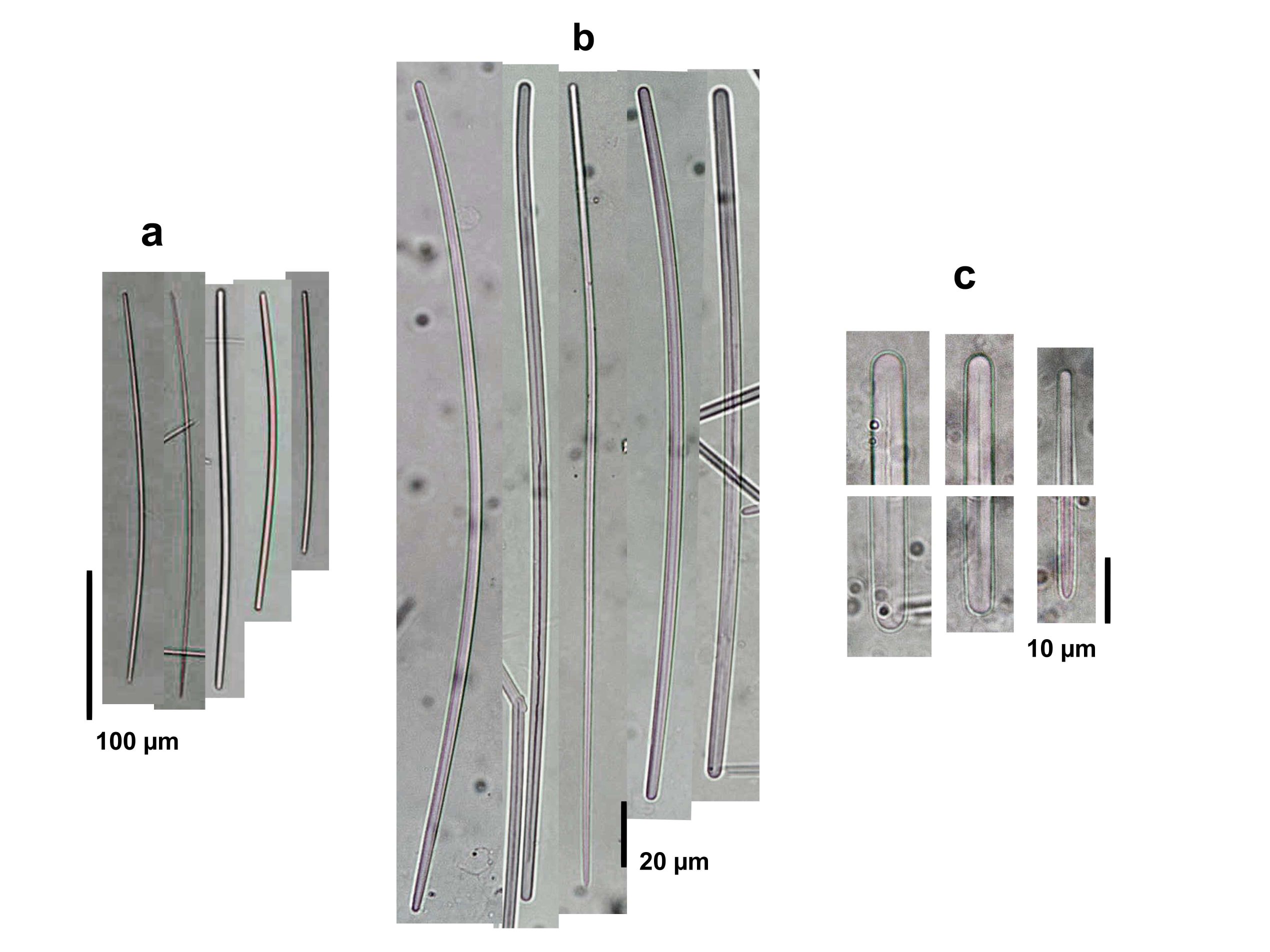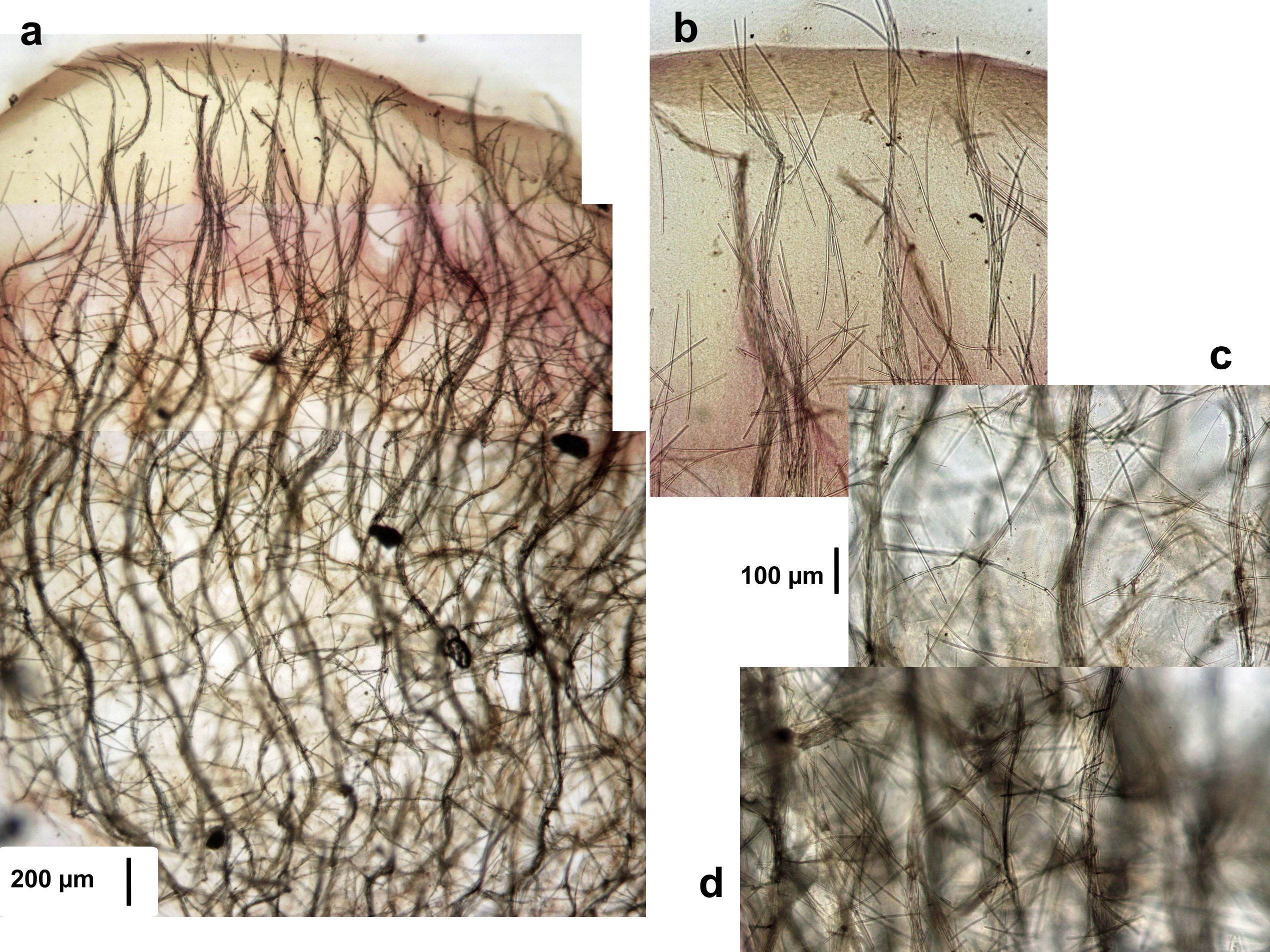the Sponge Guide - www.spongeguide.org
Observed Characteristics:
yellow
purple-violet
cream
cinnamon-tan
encrusting
lobate
massive
crumbly
Bahamas
Colombia
United States
Species Description and Notes
Description: Thick encrustations filling cracks and depressions, growing to thick masses, with oscular lobes/mounds. Size reaching 20-50 cm in diameter and 5-10 cm in thickness. Oscules 0.5-2 cm in diameter, usually on top of conical or rounded elevations. Surface smooth, shiny, although it could be partly fouled; characteristically, there are fields of 1-3 mm pores located in depressions throughout the surface. Color is lemon to orange-yellow, sometimes with reddish or golden brown tinges; subsurface color is purple brown, internal color cream. Consistency compressible but somewhat easy to tear (crumbly). Skeleton of ascending and diverging, 5-10 spicule tracts, enveloped by spongin, 30-50 µm in diameter, separated up to 250 µm, interconnected irregularly by lines of single or a few spicules enveloped in spongin. Near the surface (ca. 1 mm), the interconnections are scant, and the ascending spicule tracts end as brushes at the pinacoderm, which is 100-150 µm thick. Deeper in the choanosome there are many loose spicules partly obscuring the main reticulation. Spicules of the Bahamian material are slender, slightly sinuous and slightly asymmetrical strongyles-styloids, with one of the ends slightly pointed; developmental stages are more definitely styloids; size 190-290 µm long and 2-6.6 µm wide. Spicules of material from the continental coast of Colombia are true styles, curved to slightly sinuous, robust, there being some styloids with blunt ends, 238-450 µm long and 3.7-14.5 µm wide.
Notes: This is a shallow to deep reef species, living exposed. It was originally described under genus Pseudaxinella. Alvarez et al. (2002) suggested it belongs to genus Svenzea but it lacks the dark granular cells diagnostic for the genus. We are tentatively placing it as Svenzea?, together with Svenzea? tubulosa (Alcolado & Gotera, 1986), also pictured here, while further studies clarify their relationships. The stouter and more stylote spicules of the Colombian material are regarded as an effect of greater silicon content in continental shelf waters. Thickly encrusting specimens of this species can be confused in the field with Amphimedon? sp.-"castle morphotype", also pictured here, which also has strongyles of about the same size, but these are thicker and seldom sinuous, and developmental stages tend to be oxeote instead of stylote; also, its skeleton is a more regular reticulation. Small specimens of S? flava could be also confused with S? tubulosa, but should be distinguished by the tendency of the latter to form tubular or bushy projections that arise from the substratum; its spicules are longer (up to 340 µm) and more stylote in the Bahamas and of about the same lenght (up to 430 µm) but more anysostrongyloxeote in Colombia.
Author Reference: (Lehnert & van Soest, 1999)
Link: World Porifera Database
Tissue and Spicule Images

Spicule Images: a), b) Strongyles to styloids at two different magnifications, with thinner, developmental stages tending to be more styloid; c) endings of spicules. Sample from the Bahamas.
No source specimen image available

Spicule Images: a) Styles and styloids; b) endings of spicules. Sample from the Islas del Rosario, Colombia.
No source specimen image available

Tissue Images: a) Perpendicular section at the surface; b) view at the surface; c) view of the upper choanosome; d) view of the deeper choanosome. Sample from the Bahamas.
No source specimen image available
Images
Svenzea? flava
Location: Bahamas, Little San Salvador
Photographer: Sven Zea
![<i>Svenzea? flava</i> <br />[Bahamas, Cat Cays - Bimini]](thumbs/00121/00750.jpg)
Location: Bahamas, Cat Cays - Bimini
Photographer: Sven Zea
![<i>Svenzea? flava</i> <br />[Bahamas, Sweetings Cay]](thumbs/00121/00773.jpg)
Location: Bahamas, Sweetings Cay
Photographer: Sven Zea
![<i>Svenzea? flava</i> <br />[Bahamas, Sweetings Cay]](thumbs/00121/00775.jpg)
Location: Bahamas, Sweetings Cay
Photographer: Sven Zea
Location: Bahamas, San Salvador
Photographer: Sven Zea
Location: Bahamas, Sweetings Cay
Photographer: Sven Zea
![<i>Svenzea? flava</i> <br />[Bahamas, Stirrups Cays, N Berry Islands]](thumbs/00034/01138.jpg)
Location: Bahamas, Stirrups Cays, N Berry Islands
Photographer: Sven Zea
![<i>Svenzea? flava</i> <br />[United States, Florida Keys]](thumbs/00095/01560.jpg)
Location: United States, Florida Keys
Photographer: Joseph Pawlik
![<i>Svenzea? flava</i> <br />[Colombia, Islas del Rosario]](thumbs/00115/01942.jpg)
Location: Colombia, Islas del Rosario
Photographer: Sven Zea
![<i>Svenzea? flava</i> <br />[Colombia, Islas del Rosario]](thumbs/00115/01943.jpg)
Location: Colombia, Islas del Rosario
Photographer: Sven Zea
Location: Colombia, Santa Marta
Photographer: Sven Zea
![<i>Svenzea? flava</i> <br />[Colombia, Santa Marta]](thumbs/00115/01945.jpg)
Location: Colombia, Santa Marta
Photographer: Sven Zea
![<i>Svenzea? flava</i> <br />[Colombia, Santa Marta]](thumbs/00115/01946.jpg)
Location: Colombia, Santa Marta
Photographer: Sven Zea
Location: Colombia, San Andrés Archipelago, San Andrés Island
Photographer: Sven Zea
Location: Colombia, San Andrés Archipelago, San Andrés Island
Photographer: Sven Zea
Location: Colombia, San Andrés Archipelago, San Andrés Island
Photographer: Sven Zea